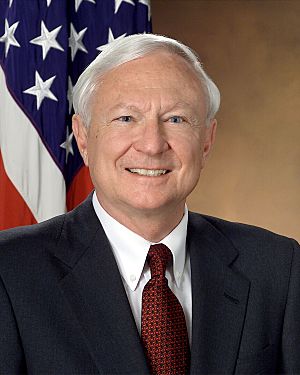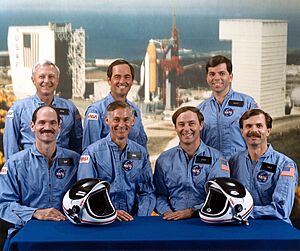Edward C. Aldridge Jr. facts for kids
Quick facts for kids
Pete Aldridge
|
|
|---|---|
 |
|
| 16th Secretary of the Air Force | |
| In office June 9, 1986 – December 16, 1988 Acting: April 6, 1986 – June 8, 1986 |
|
| President | Ronald Reagan |
| Preceded by | Russell A. Rourke |
| Succeeded by | Donald Rice |
| 9th Director of the National Reconnaissance Office | |
| In office August 3, 1981 – December 16, 1988 |
|
| President | Ronald Reagan |
| Preceded by | Robert J. Hermann |
| Succeeded by | Martin C. Faga |
| Personal details | |
| Born |
Edward Cleveland Aldridge Jr.
August 18, 1938 Houston, Texas, U.S. |
| Political party | Republican |
| Education | Texas A&M University, College Station (BS) Georgia Institute of Technology (MS) |
Edward "Pete" Cleveland Aldridge Jr. (born August 18, 1938) is an expert in aerospace engineering. He also served as a government official in the U.S. Defense Department. He was chosen to be a payload specialist for a Space Shuttle mission called STS-62-A. This mission was planned for July 1986.
However, the mission was canceled after the Space Shuttle Challenger disaster in January 1986. Because of this, Aldridge never flew into space. In the 1980s, he held important roles like Under Secretary of the Air Force and Secretary of the Air Force. He also led the National Reconnaissance Office. Later, he worked for President George W. Bush as the Under Secretary of Defense for Acquisition, Technology and Logistics.
Contents
Early Life and Education
Edward Cleveland Aldridge Jr. was born in Houston, Texas. His parents were Lillie Idell Radford and Edward Cleveland Aldridge. He studied aeronautical engineering at Texas A&M University. He earned his Bachelor of Science degree in 1960. Later, he received a Master of Science degree from the Georgia Institute of Technology.
A Career in Government and Space
Pete Aldridge played a very important part during the Cold War. This was a time when the U.S. and the Soviet Union had a tense relationship. He helped make sure the U.S. military could always use space for important missions.
From 1981 to 1988, he was the Director of the National Reconnaissance Office. This U.S. government agency designs, builds, launches, and manages America's spy satellites. At that time, the U.S. relied only on the Space Shuttle to launch large equipment. Aldridge was concerned about this.
He started a project for a second type of rocket, the Titan IV. He ordered 10 of these rockets in 1985. When the Space Shuttle Challenger exploded in 1986, the U.S. military could still launch its important equipment. This was because the Titan IV rockets were available. The Space Shuttle fleet was grounded for two years after the accident.
In 2001, Aldridge became the Pentagon's top person for buying weapons. His job was called Under Secretary of Defense for Acquisition, Technology and Logistics. He was in charge of buying new equipment, research, and advanced technology. He also oversaw international programs and environmental safety.
During his time in this role, he approved the purchase of F-35 fighter jets in 2002. This happened before all the important tests were finished. He said the F-35 was "setting new standards for technological advances." However, a later official disagreed with this decision.
Aldridge held many different jobs throughout his career. He was the Secretary of the Air Force. He also led companies like McDonnell Douglas Electronic Systems Company. He was an adviser for important arms control talks. He also guided the Air Force space program.
Groups and Organizations
Pete Aldridge was part of several important groups. These included:
- President and Fellow of the American Institute of Aeronautics and Astronautics
- Member of the Defense Science Board
- Member of the National Academy of Engineering
- National director for the Air Force Association
- Member of the board of directors for the United States Air Force Academy Foundation
Awards and Honors
Aldridge received several awards for his public service. These include:
- Department of Defense Distinguished Civilian Service Award
- Secretary of Defense Meritorious Civilian Service Award
- Department of Defense Distinguished Public Service Award
In 2005, he received the General James E. Hill Lifetime Space Achievement Award. The Space Foundation gives this award to people who have made big contributions to space technology.
 | Jewel Prestage |
 | Ella Baker |
 | Fannie Lou Hamer |


